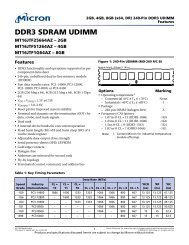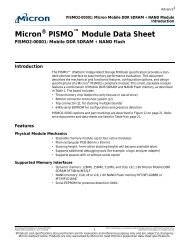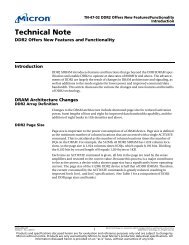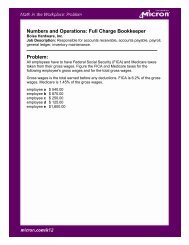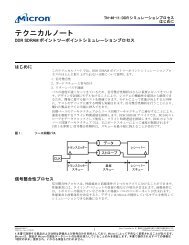Code of Business Conduct and Ethics - Micron
Code of Business Conduct and Ethics - Micron
Code of Business Conduct and Ethics - Micron
You also want an ePaper? Increase the reach of your titles
YUMPU automatically turns print PDFs into web optimized ePapers that Google loves.
Competition laws can cover conduct outside the country. Some<br />
competition laws – such as the U.S. antitrust laws – can apply even when the<br />
conduct occurred outside the country’s borders.<br />
Penalties are severe. In the U.S., individuals convicted <strong>of</strong> price-fixing <strong>of</strong>ten receive<br />
stiff fines <strong>and</strong> prison sentences, <strong>and</strong> companies have received fines <strong>of</strong> hundreds <strong>of</strong><br />
millions <strong>of</strong> dollars. In the E.U., fines for anticompetitive behavior can be ten percent<br />
<strong>of</strong> global sales. In the U.S., customers <strong>and</strong> competitors can sue for three times the<br />
actual harm caused.<br />
Careless conduct can violate the law. What might seem to be ordinary business<br />
contacts, such as a lunch discussion with a competitor’s sales representative or<br />
a gripe session at an industry trade association, can easily lead to competition<br />
law violations.<br />
Basic Rules to Know:<br />
Certain agreements are criminal violations in the U.S. <strong>and</strong> are almost<br />
universally condemned around the world. Unless you have prior approval <strong>of</strong> the<br />
Legal Department, never talk with, make agreements with, or exchange information<br />
with competitors about:<br />
• Fixing prices – this can include setting minimum or maximum prices or<br />
“stabilizing” prices;<br />
• Fixing terms related to price, pricing formulas, credit terms, etc.;<br />
• Dividing up markets, customers or territories;<br />
• Limiting production;<br />
• Rigging a competitive bidding process, including arrangements to submit<br />
sham bids;<br />
• Boycotting a supplier, customer or distributor; or<br />
• Boycotting others in the marketplace – competitors, suppliers or customers.<br />
Because <strong>of</strong> the risk, do not even discuss competitive matters with competitors – at<br />
any time or any place – unless your Department Manager or the Legal Department<br />
approve it.<br />
Other activities may raise competition issues. Always consult with your<br />
Department Manager or the Legal Department before:<br />
• Entering into joint ventures, mergers, acquisitions <strong>and</strong> marketing, purchasing<br />
or similar collaborative arrangements with competitors;<br />
• Establishing exclusive dealings arrangements (e.g., contracts that require a company<br />
to buy only from <strong>Micron</strong>);<br />
• Tying or bundling together different products or services (e.g., contracts that require<br />
a buyer who wants one product to also buy a second “tied” product);<br />
• Entering into “requirements contracts” (contracts where it is agreed products,<br />
services or materials will be exclusively provided);<br />
• Participating in activities involving trade associations or setting industry st<strong>and</strong>ards;<br />
i<br />
If you have questions<br />
or concerns about your<br />
responsibilities under the<br />
competition laws, consult<br />
“The Antitrust Compliance<br />
Manual” on the MERC or<br />
contact your Department<br />
Manager or the Legal<br />
Department.<br />
11




